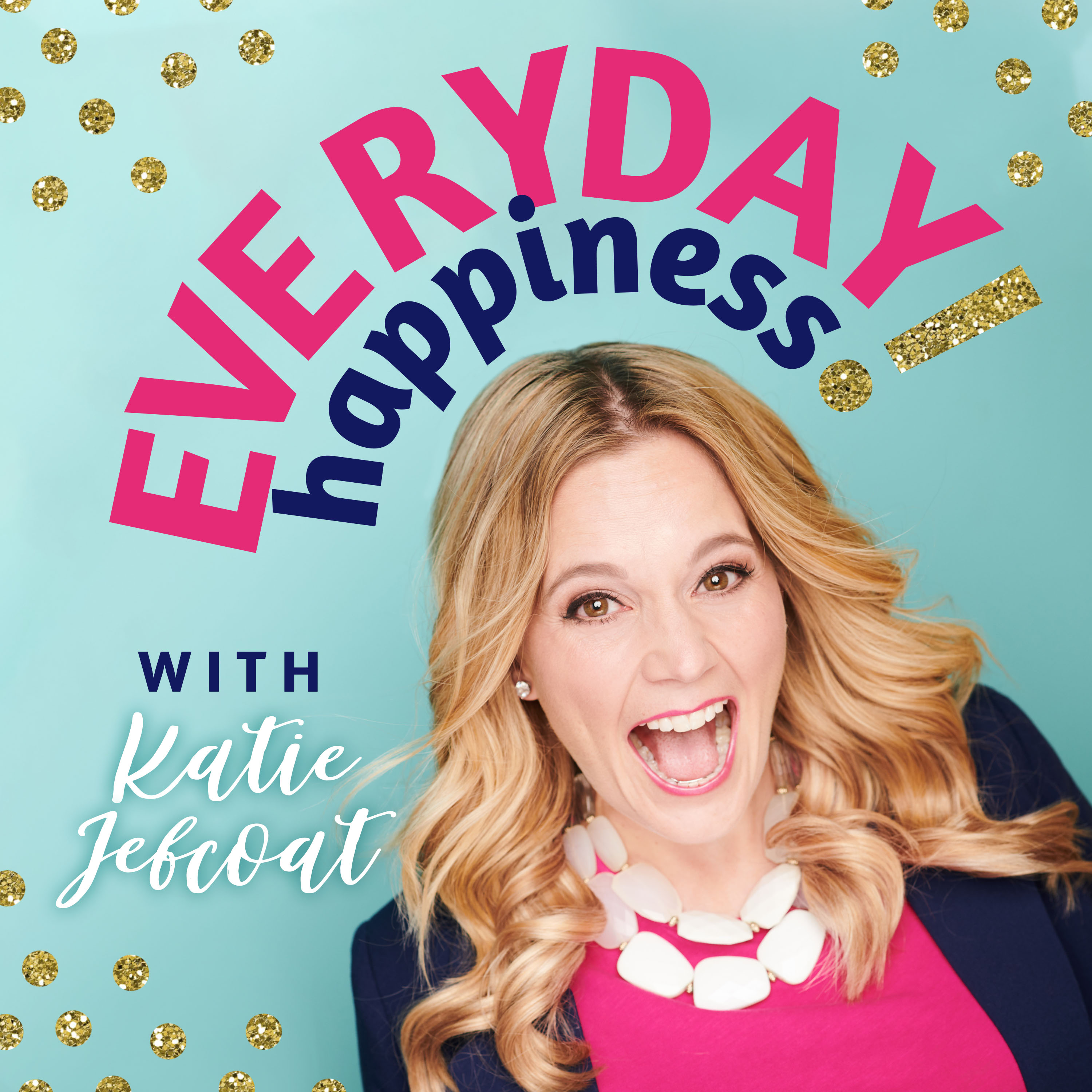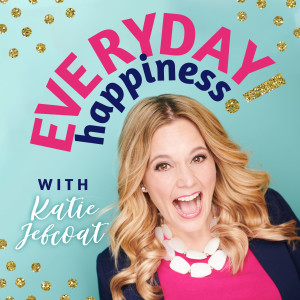
28.4K
Downloads
674
Episodes
Do you feel overwhelmed with your todo list? Is "creating fulfilling happiness" missing from that list? Everyday Happiness with Katie Jefcoat is here to help you. In 2-minutes a day, over time, you’ll discover how to reduce overwhelm and create lasting happiness through Katie’s signature method of Intentional Margins, happiness science, and musings about life. Start your day with a positive mindset. Many of us can get deep in the feeling of overwhelm. The anxiety of our own ambition can weigh heavily on our thoughts and emotions. We lay down and close our eyes at night and our chest begins to feel heavy. More items on the to-do list than the day before. How will we ever going to get off the hamster wheel of to-dos? When are we going to start living life for more than the hustle? As a recovering lawyer and passion driven entrepreneur, Katie knew something had to change. What she found is that you can have harmony, be intentionally productive and create massive impact, all at the same time - without feeling guilty. So she asked herself a simple question: "How can I get off the hamster wheel and how can I show others how to do the same? She knew she'd had a system for herself, but she’d never put it into defining words. On August 15, 2019, she sat down at her dining room table with her friend Jenna (her business bestie). Post-It notes covering the table. This is where she first defined the concept of Intentional Margins. What are Intentional Margins? INTENTIONAL MARGINS™ (n): A buffer of space and time to create harmony between your to-do’s and your priorities. Now you can get the support you need to manage your overwhelm, one little tip at a time. Regardless of the industry, Everyday Happiness blends inspiration with a pragmatic approach to finding Harmony. You'll be encouraged to throw “balance” out the window for a more achievable approach called harmony. Through Intentional Margins™, you'll be encouraged to develop what harmony means to you, by identifying your priorities at work and at home. Every day, we'll end the podcast help you feel equipped to jump off the hamster wheel of overwhelm and go out there and crush your day. --About the Host-- Katie Jefcoat is a community curator, speaker, author and motivator who supports ambitious women (and a few good men) move from feeling hectic to harmonious. As a recovering trial lawyer, she knows first hand what it feels like to have a demanding job. As an entrepreneur with a passion that lights her hair on fire and a busy family she’s in the thick of it with you. Many people strive for balance and think overwhelm is just a part of life. Sadly, the hustle culture and our never-ending to-do list is creating a life where our priorities are getting the leftover scraps of time. Katie introduces people to what she calls - Intentional Margins™ - a kind of life in which they reduce randomness, create harmony between their to-dos and their priorities and intentionally enjoy the meaningful parts of life - without feeling guilty. Without exposure to a different way, we remain stuck on the hamster wheel of to-dos and never find the “balance” we yearn for. Katie works diligently to expose her community to different ways of doing things, because she fundamentally believes we deserve to make time for our priorities. We deserve to live a life of harmony. And it’s within our control to create it. Katie curates a smorgasbord of content related to managing your calendar, handling overwhelm, setting boundaries, reducing randomness, saying no, self-care, the power of your choices, and more in her Intentional Margins™ Membership Community -- which she calls the coziest virtual coffee shop (on Facebook). Connect and learn more at www.katiejefcoat.com.
Episodes

Sunday Mar 26, 2023
Sunday Mar 26, 2023
Our brains will always be mistaken about how happy something will make us in the future. As humans, we almost always mispredict the duration of how good or bad a feeling will be. This is one of my biggest takeaways from writing 668 daily happiness podcast episodes. Tune in to learn more.
Transcript:
Welcome to Everyday Happiness, I'm your host Katie Jefcoat, and as we close out this podcast, we invite you to join our happy mail email community, where you’ll continue to get happiness and kindness content delivered straight to your inbox. We think it’s the happiest email in your inbox. You can join at www.katiejefcoat.com
Today, I share one of my biggest takeaways from writing 668 daily happiness podcasts. It starts with a lecture from Yale professor Dr. Laurie Santos who introduces the work of researchers and professors Tim Wilson at the University of Virginia, and Dan Gilbert at Harvard. They coined this fantastic term called MISWANTING. The definition of this is “this act of being mistaken about what and how much you're going to like these things in the future.” The problem is that our brains deliver to us this idea that we want certain things, but we are often wrong about it. We are constantly miswanting.
So why does this miswanting occur, and what can we do about it? Well, the researchers seem to think that just being aware of our biases is the way to counterbalance miswanting. It can be as simple as wanting a doughnut. I want a fried dough ball with sugary frosting, it will taste good, and it will make me happy. I eat the doughnut, and although it tastes delightful at the moment, now, I am no longer happier - the feeling didn’t last. I miswanted.
This all comes down to the perils of us humans predicting our future feelings, and people specifically mispredict the duration of how good or bad a feeling will be.
This means that our intuition, and our minds, are playing tricks on us and making us think things that are just false. We see this with algebra problems, vision exercises - which table is longer - on social media. We think it’s one thing, but the fact is, it’s definitely the other.
You think that if you walk out of your house and get hit by a car, you will be unhappy for the rest of your life. But that’s also just not true.
You think that if you are in school and you get better grades than you expect, you will be happier. You think that if you win the lottery, all of your worries will disappear, and you will be the happiest ever. But all of this is just not true. It’s not how happiness works. The data says you will go back to baseline. Scientists call this hedonic adaptation. It’s when you get that job promotion, and you think that’s all you’ll ever need, and a few years later, you want another promotion.
This is fascinating because we can see how our brain tricks us into choosing material items or goals that are just wrong. We think the bad thing will be so much worse than it is, and we think the good thing, winning the lottery, will be so much better than it is. We humans get it wrong - almost all of the time.
We also know that our mind compares our wants against reference points instead of absolutes, and then, our minds have this terrible tendency to get used to stuff, and we don’t even realize it. But, the good news is that if we are intentional, we can overcome these human biases.
When we think about the ways we try to make ourselves happy, Dr. Santos says the first way is to not invest in awesome material stuff. Even if we think it’s the coolest thing. The new car just becomes the car. Being aware of it is half the battle. We get used “stuff” and over time, there just isn’t that much happiness to derive from it.
On the flip side, forget about the stuff and, instead, consider investing in experiences. Experiences don’t stick around, we don’t have time to adapt to them. So what we are left with is this wonderful memory of the experience.
The science indicates that people who invest in experiences are, in fact, happier. So instead of thinking about how you might treat yourself with stuff, change it around and think about experiences instead.
Also, it’s hard to have a social comparison when you are talking about a trip versus a new pair of shoes or your car versus someone else's car. So if we are the type of people that invest in experiences, we are more likely to not compare ourselves to other people’s awesome experiences.
The insight is simple. As humans, we will overestimate almost all of the time how happy something will make us. Be aware of that the next time you want something. Consider experiences over things and push against social comparison. Being intentional about our thoughts, with this piece of knowledge, is one way we can boost our happiness.
Life is heavy enough; we shouldn’t have to search for happiness. Get the exclusive happiness email, delivered with a smile twice a month to your inbox. https://www.katiejefcoat.com/email
And, let’s connect on social at @everydayhappinesswithkatie and join the community on the hashtags #IntentionalMargins and #everydayhappinesswithkatie on Instagram
Links: https://onamission.bio/everydayhappiness/

No comments yet. Be the first to say something!